Carl Hester–Price of Horses, Importance of Training, Spirit of Success. Part 2 of 2
7 years ago StraightArrow Comments Off on Carl Hester–Price of Horses, Importance of Training, Spirit of Success. Part 2 of 2

Feb. 26, 2018
By KENNETH J. BRADDICK
Carl Hester likes to buy horses when they’re young–if they don’t cost a lot it leaves money for what he regards as most important, training. His own record is testament to his journey of competing in all five Olympics since 1992, winning team gold at home in London in 2012 and team silver four years later in Rio de Janeiro.
And he sees parallels between the current approach to dressage in Great Britain and the United States.
“That’s changing in Great Britain and the USA because of heightened levels of professionalism,” he told dressage-news.com in a recent interview at the Global Dressage Festival grounds in Wellington, Florida. “People have realized those days of just buying yourself a fancy horse and getting to the very top are gone.
“Yes, you can still do it to a very good level, but those partnerships from the bottom to the top are enduring, successful and generally make medals. That gives you an added something, not only as a horse person but having that complete and utter trust in each other.”
Carl gets to share his knowledge and experience as the host of a master class at the Adequan Global Dressage Festival grounds in Wellington Wednesday (Feb. 28) evening. He’ll coach six riders at different levels in a three-hour clinic. General admission is $30 per person, and $10 for parking. The VIP cost is $300. Tickets are available at www.globaldressagefestival.com.
At the age of 50, Carl’s resume includes five Olympics, team silver at both the 2010 Lexington and 2014 Normandy World Games, eight European Championships from 1991 through 2017 and two World Cup Finals, the most recent at Omaha in 2017 that’s in the books as one of the most fun ever as well as top sport. He has been the trainer and mentor of Charlotte Dujardin, with Valegro and now with the likely successor, Mount St. John Freestyle as well as other horses. Chances are at least half, and maybe all, of a British senior championship team will be coached by Carl.
Britain doesn’t have a team coach like Germany, the Netherlands and the United States. But in recent years has depended on a high performance sports director–it was Will Connell for 11 years before he was poached away by the U.S. in 2014. A performance manager helps keep everything running smoothly, currently Caroline Griffith, the mother of Big Tour competitor Lara.
Funding of high performance sport is vastly different in the two countries. Lottery and government funding can cover a substantial amount of costs in Britain while in America everything is privately funded, whether by individuals, corporations or governing bodies that get their money from membership fees and sponsorships.
Whatever the source of funding, in Carl’s view, fitness, nutrition and other aspects of maintaining a high performance horse are important but “training is where most of the money should go.”
He sees more people training than ever before, unafraid to make mistakes as they train their horses to Grand Prix.
Although he agrees the cost of a horse, maintenance, training and entering shows is high “it’s like everything.”
“When you were young, you thought you could never afford a house,” he explains. “I remember somebody saying to me, ‘the day you actually put some money in the bank and you get a bit you will start adding to it instead of just saying you’ll never be able to afford it.’ In a horse situation, once you start investing, once you start training you will subscribe to the view that the more you spend the better you get.
“If you’ve got the right trainer that’s where your investment should be.”
Carl believes it can still be done without breaking the bank.
He cites Hayley Watson-Greaves, the 34-year-old British team rider who recently married her long-time partner, as “another fine example” of how to make her horse life work on a budget.

“She’s a national champion, she’s doing the Word Cups, she’s been very successful. She was an amateur,” he said. “Her hard work and her dedication has helped her become what she is. She has to work all the hours she can every day to pay for that horse. Hayley would sleep in her lorry (truck). She drives her own horse everywhere. People also make it without being at the high end.
“Everything costs money whatever you do. I’m not saying you don’t need it, you definitely do. But there are different ways of doing it.
“It’s still more the want and the dedication . It’s still there in some people, and when you see it in Hayley as it is in Charlotte (Dujardin) I still think no matter what happens they are still going to make it. Those that say they can’t afford a good horse are still doing it. That goes to show you will find a way.”

